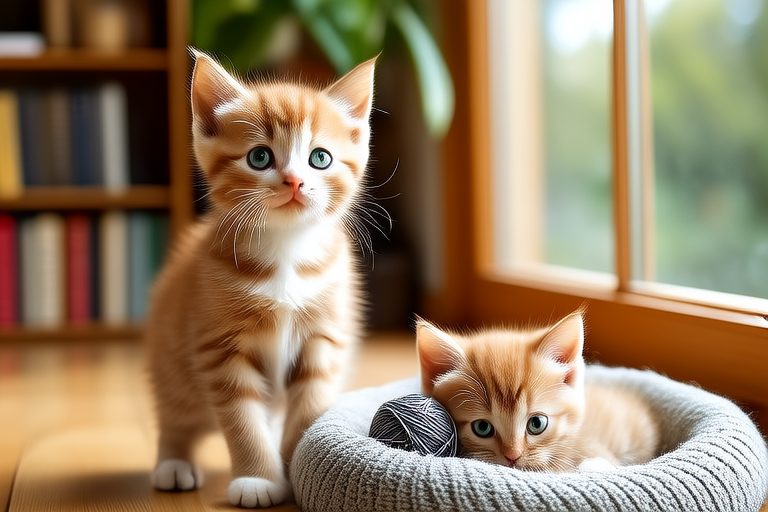The Unique Munchkin Cat Breed: A Comprehensive Guide
The Munchkin cat is a breed that has captured the hearts of many cat enthusiasts with its unique physical characteristics and delightful personality. Known for its short legs, this breed offers a charming and endearing presence that sets it apart from other feline breeds. In this article, we will delve into the origins, physical traits, temperament, health considerations, and care requirements of the Munchkin cat, providing you with all the essential information you need to know about this special breed.
Distinctive Physical Features
The most striking feature of the Munchkin cat is undoubtedly its short legs. These cats have a genetic mutation that causes their legs to be significantly shorter than those of other cats. Despite their diminutive stature, Munchkins are still agile and capable of moving quickly and gracefully. Their bodies are proportionate, with a sturdy build and a rounded head that gives them a sweet and innocent expression. The Munchkin’s short legs are often accompanied by large paws and long, slender tails, adding to their unique appearance.
Munchkins come in a variety of coat colors and patterns, including solid colors, tabby patterns, and bicolors. They can have either short or long hair, depending on the individual cat. Their coats are soft and silky, requiring minimal grooming. The breed’s eyes are typically large and expressive, adding to their charm and appeal.
Origin and History
The Munchkin cat breed originated in the United States in the late 20th century. The first known Munchkin cat was discovered in Louisiana in 1983 by Sandra Hochenedel, who found a stray cat with unusually short legs. She named the cat Blackberry, and later bred her with a domestic shorthair male. The offspring inherited the short-legged trait, and the Munchkin breed was born.
The breed gained recognition from The International Cat Association (TICA) in 1994 and was granted championship status in 2003. However, the breed remains controversial among some cat fanciers due to concerns about the health implications of the genetic mutation responsible for the short legs. Despite these concerns, Munchkins have continued to grow in popularity, with many admirers appreciating their unique appearance and friendly personalities.
Temperament and Personality Traits
Munchkins are known for their friendly and outgoing personalities. They are generally social cats that enjoy interacting with their human companions and other pets. They are curious and playful, often displaying a kitten-like enthusiasm for toys and games well into adulthood. Munchkins are also known for their intelligence and problem-solving abilities, making them entertaining and engaging companions.
These cats are adaptable and can thrive in various living situations, from small apartments to larger homes. They tend to be good with children and other pets, provided they are introduced gradually and given time to adjust. Munchkins are not overly demanding of attention but do appreciate regular interaction and playtime. They are affectionate without being clingy, making them ideal companions for busy households.
Anecdotes from Owners
Many Munchkin owners attest to the breed’s unique charm and personality. One owner, Sarah, shared her experience: “My Munchkin, Charlie, is such a joy. He may be small, but he’s incredibly active and always keeps me entertained. He loves chasing toys and playing hide-and-seek around the house. His short legs don’t slow him down at all!” Another owner, Tom, added, “My Munchkin, Luna, is the perfect lap cat. She’s so affectionate and loves to curl up with me on the couch. Her playful nature never fails to bring a smile to my face.”
Health Considerations
While Munchkins are generally healthy cats, there are some health considerations specific to this breed. The most significant concern is the genetic mutation responsible for their short legs. Some Munchkins may develop spinal issues, such as lordosis (an inward curvature of the spine) or spondylosis deformans (bone spurs along the spine). Regular veterinary check-ups and maintaining a healthy weight can help minimize the risk of these conditions.
Another potential health issue is pectus excavatum, a condition where the sternum is sunken inwards. This condition can affect the heart and lungs, so it’s important to monitor your Munchkin’s breathing and consult a veterinarian if you notice any changes.
Grooming and Care Requirements
Munchkins require minimal grooming, regardless of whether they have short or long hair. Regular brushing once or twice a week will help keep their coats shiny and prevent matting. Bathing is usually unnecessary unless your Munchkin gets particularly dirty or has a medical condition that requires it.
In addition to grooming, it’s important to provide your Munchkin with a balanced diet and plenty of exercise opportunities. Obesity can exacerbate health issues, so maintaining a healthy weight is crucial. Interactive toys, climbing structures, and play sessions with your Munchkin can help keep them physically and mentally stimulated.
Why Consider the Munchkin Breed?
If you’re considering adopting a Munchkin cat, there are several reasons why this breed might be a great fit for your household. Their friendly and social nature makes them excellent companions for families with children and other pets. Their playful and intelligent personalities ensure that they will never be boring, always bringing joy and entertainment to your home. While they require minimal grooming, their unique appearance and endearing expressions make them stand out as eye-catching additions to any family.
Ultimately, the decision to adopt a Munchkin cat depends on your lifestyle and preferences. If you’re looking for a cat with a distinctive appearance and a delightful personality, the Munchkin could be the perfect choice for you. With proper care and attention, these charming cats can bring years of happiness and companionship to your home.
